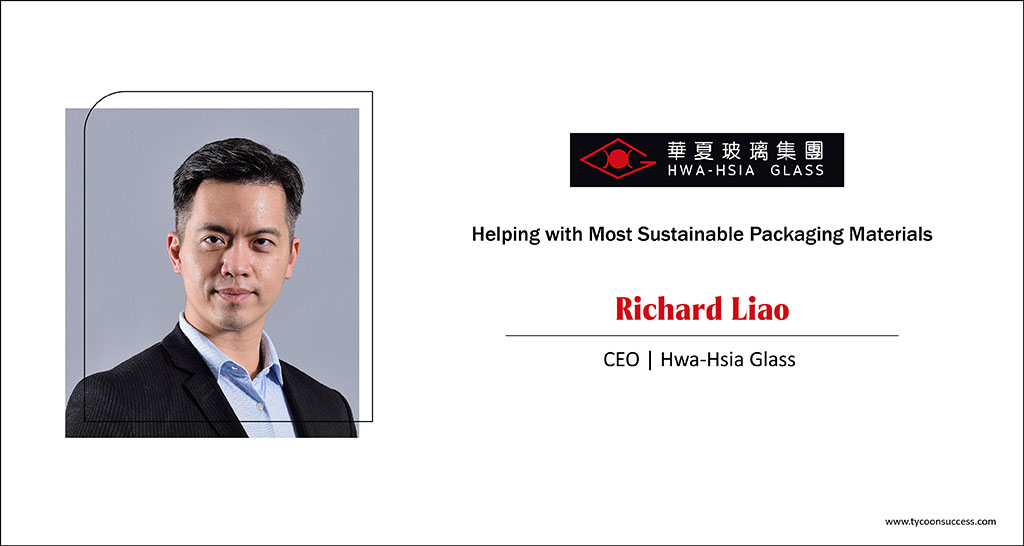Born in Springfield, Illinois., Richard Liao moved back to Hsinchu, Taiwan, at the tender age of two and again returned to the U.S. in 1999. During his second stint in the country, Richard completed his high school in C.A. and finished his college degree from Cornell University with a B.A. in ORIE and a Master of Engineering in Financial Engineering. Soon after completing his education, Richard landed a job at JP Morgan, a corporate & Investment bank on Wall Street. He worked for the investment bank for three years, but due to the subprime mortgage financial crisis, times were not good, so Richard left the organization to complete his MBA from NYU Stern.
Soon after completing his MBA in 2012, Richard got a call from his dad, as he needed some help with the family business. So, Richard returned to Taiwan and relearned his philosophy on work and what to do with the business. After identifying several critical areas of improvement, Richard could transform the company from a gross margin of 7%, doubling to 14% by 2021 while reducing the total headcount from 1200 to 650.
Presently, Richard serves as the CEO of his family business Hwa-Hsia Glass, the only glass manufacturing facility specializing in ‘small quantities with a vast variety’ strategy in Asia-Pacific. The organization annually produces nearly 400k tonnes of glass containers, including food, milk, alcoholic beverage, medical-use, light bulb, and cosmetic containers.
Besides the traditional B2B businesses, Richard helped the company to launch a B2C brand named ‘Aqua-Soul,’ targeting lifestyle-driven consumer segments in daily storage glass products, including decanters, wine, and whiskey glasses, tea sets, etc., to introduce glass in a much more elegant way.
“We also focus on B2B2C clients with our “total solution strategy”- for small retailers who want to open new restaurants, shops we can provide end-to-end solutions for any glass-related packaging needs, and we launched on our e-commerce platforms such as Alibaba or Amazon, Shoppee, etc.“- states Richard.
Reviving the Brand
Once Richard decided to help his family run H.H. Glass, he realized the company was facing three primary problems, firstly, it had no new business model; secondly, it failed to attract employees; and thirdly, the image of the industry.
- Solving the old problem: The Aquasoul brand and total solution were Richard’s ideas, so the company could create a new business model and improve its gross margin. Richard demanded that the team must give H.H. glass 30% of the gross margin, which resulted in a gradual improvement of the overall gross margin to 14%, and with the new brand, the firm was able to launch as many as 200 products with cross creativities from several industry leaders and designers.
- Attracting Employees: Under Richard’s leadership, H.H. Glass launched its digital transformation strategy and invested in SAP ERP to identify bottlenecks in its value chain. It also introduced 15 robotic arms to increase productivity. This eventually freed up 25% of labor times, which helped to do more high-value work and decreased headcount by 45%. With this level of digital transformation, H.H. Glass could compete in talent recruiting in the harsh environment of Hsinchu, Taiwan.
- Solving the Sunset Industry Problem: Richard launched ESG initiatives, through which he was able to guide the company against GRI and SDGs set by the U.N. Although the brand was not required to do so, in August 2022, it issued its first-ever ESG sustainability report. In this report, the firm has identified several important ‘stakeholders’ with respect to shareholders, workers, clients, suppliers, etc. The firm also reduced 17425 tonnes of CO2 emission in 2021. Richard says, “We believe that making glass from recycled, reused, and reduced is sustainable, and as we keep doing this business, we are doing our earth good; that’s our mission.”
Tackling Daily Challenges
Richard finds it challenging to assess whether the level of tasks is easy or hard because each day is different. He says, “To cover all areas of the business and discuss with a meeting on important issues to look into can be challenging yet rewarding once you can identify insights of next step. Different from a department perspective, and it is more of a global perspective.”
Under Richard’s leadership, H.H. Glass aspires to provide the most sustainable packaging materials globally to avoid harmful packaging materials to the earth, such as plastics or PET. He believes the firm is following its mission and vision with its new branding strategy, digital transformation, and ESG initiatives. It is a matter of time when people will understand the usage of 100% recyclable products like glass packaging needs to be increased to reduce our waste and damage to the already fragile ecosystem.
Picture of the Future
Richard believes it’s very tough to predict the political and economic outcome of our world, and as a company leader, it isn’t easy to understand a lot of things happening across the planet, which can affect business strategy.
He says, “As the Ukraine-Russian war goes on, the oil price is skyrocketing; also, living in Taiwan, you are not sure when we will become like Ukraine! So to continue our operations, we are investigating other options such as relocating factories to other southeast countries- but I admit these days running a business, we do face more political and economic risks compared to first-generation leaders.“

